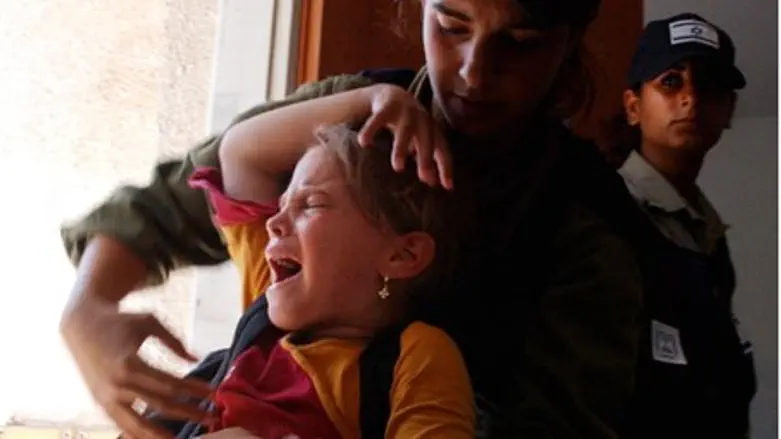
The first-ever academic conference studying Israel's Disengagement from Gush Katif will commence Thursday. In light of the historic event, Arutz Sheva spoke to prominent political strategist Eyal Arad and Samaria (Shomron) Regional Council Chairman, Gershon Mesika.
Arad, who will be one of the main speakers at the conference, noted that the main lesson from the horrors of the Disengagement is how a bad idea can be "sold" to the public so easily.
"You can gain public support for an idea that is, by nature, complex and abstract, via media and marketing," Arad stated. "Naturally, the political considerations behind the move cannot be brought to the public forum [...] They generally include an analysis of the security situation and are too complex to explain to everyone."
Arad emphasized that the way an idea is marketed shapes public opinion. Even if 97% of Judea and Samaria were to be given away tomorrow, according to Arad, "the public would ultimately support it if they believe a decisive and responsible leadership" is behind the move.
The expert clarified that even a unilateral withdrawal without a peace agreement could be "sold" to the public - under the right conditions. "It would be possible [to go through with it], even if it would be more difficult [for the public to accept]," Arad stressed. "What matters most is the quality of leadership [behind a political move] - not the terms of the agreement."
Despite this, Arad noted that Prime Minister Binyamin Netanyahu may have a more difficult time swaying public opinion this time around. The Israeli public lacks confidence in Netanyahu's security background - he has less experience than his predecessors - and as such, the public may feel like they do not have strong enough leadership to rally behind in case a withdrawal turns sour.
Public confidence, Arad stressed, was the driving force behind public support for other withdrawals and tough military decisions.
"This is what happened with [Prime Minister Yitzhak] Rabin before the Oslo Accords, this is what happened on the eve of Barak's retreat from Lebanon, and this what happened before Sharon began the Disengagement from Gaza," he said, noting that all of them had the public's confidence in their abilities to defend Israel. "Netanyahu does not have the security background that they had and is relying on meaningful marketing [for a peace agreement]."
As for the Disengagement plan itself, Arad believed that the plan was justified, even if not entirely necessary; it gave free license for the IDF to carry out two separate operations in Gaza that were, in his words, highly successful.
He claimed that while Hamas's takeover in Gaza upped terror threats from Israel's enemies, the cost of defending Jewish communities there was too great before the Disengagement, and that no less than "an [army] division and a half" could have kept the area secure.
In addition to this, Arad claimed, Israel's relationship with Egypt has been strengthened after the Disengagement, as both struggle to fight against Hamas. As for the terror tunnels and Hamas leadership, the strategist noted that both were a problem before the Disengagement in any case.
Lessons from the Disengagement: Growth in Samaria is key
Samaria (Shomron) Regional Council head Gershon Mesika related to Arutz Sheva that the Disengagement affected him deeply on a personal level.
"After the Disengagement, it became deeply apparent to me that we need to grow and keep growing," Mesika stated. "No one is talking about withdrawing from Ariel because it is too big, and I am happy that I have managed to grow the Samaria [Jewish] population by 50%, but it's not enough. The more we grow, the more we are capable of convincing the next leader considering a withdrawal, that the idea is impossible."
"My conclusion from the Disengagement is that we have to struggle to [prevent another withdrawal] in an entirely different field: public consciousness," he continued. "To do this, we must tackle two fronts."
"The first is political," he noted. "We have worked with the Likud and we are building a strong bloc in the movement, one which has pushed [the issue of] Judea and Samaria high on the agenda."
"The second is our larger enemy: ignorance," Messika reflected. "The nation and its politicians have no idea what Samaria is and who lives there. Therefore we have arranged over 700 visits by policy-makers so far and brought more than 2,000 busloads of Israeli citizens to tour the region."
To have an impact on Israel's policies, Mesika noted that the point of these tours is to provide visitors with "flashes of realization" which make Samaria more relatable as a place, not a political pawn.
One of his methods is to point out how close Samaria, and specifically the area around Ariel, are to the densely populated Gush Dan area. Another is to show them Barkan, the industrial area which sees Israelis and Palestinian Authority (PA) Arabs working side-by-side. Yet another is to point out how narrow the strip of land Israel would have as a "buffer zone" in the event that the PA was given the Jordan Valley.
"Any thinking person realizes that whoever controls the Jordan Valley will also control whether planes can successfully take off at Ben-Gurion airport and whether we can live quietly in Kfar Saba and Netanya," he noted.